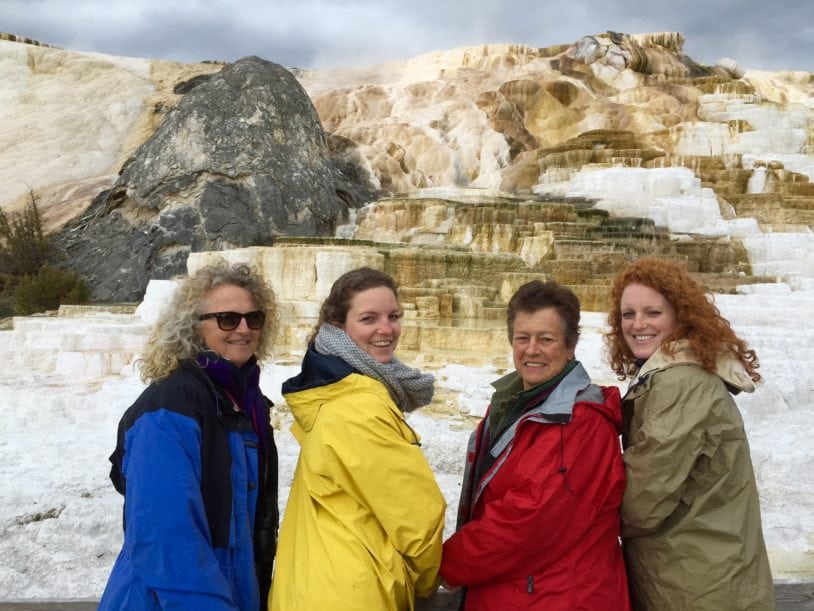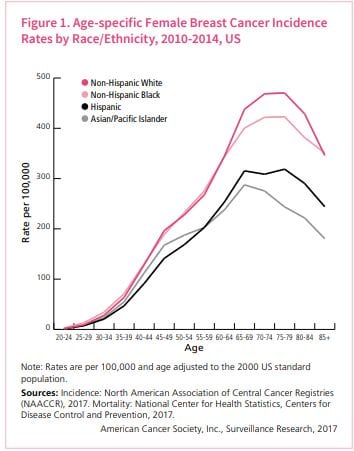Breast cancer has impacted many guests of AdventureWomen and many of us in the AdventureWomen family, which is why we are once again honoring breast cancer research and awareness throughout October.
Breast cancer affects all women, whether directly or indirectly. As a society, we have come so far in terms of awareness, early detection, and better treatment methods. Just earlier this week, the Nobel Prize in Physiology of Medicine was awarded to Drs. James Allison and Tasuku Honjo for their work on immunotherapy, which may significantly change and broaden the outlook for improved treatment for breast and other cancers.
 This month, AdventureWomen once again honors not only the legacy of Susan Eckert as well as the resilience of all other women affected by this disease by donating 5% of our profits for the month of October to the Breast Cancer Research Foundation. AdventureWomen is also donating, year-round, 50% of the profits from our online store in support of this cause. Advancement in research benefits all of us!
This month, AdventureWomen once again honors not only the legacy of Susan Eckert as well as the resilience of all other women affected by this disease by donating 5% of our profits for the month of October to the Breast Cancer Research Foundation. AdventureWomen is also donating, year-round, 50% of the profits from our online store in support of this cause. Advancement in research benefits all of us!
2018 BREAST CANCER FACTS AND STATS
The American Cancer Society published a comprehensive report about breast cancer in 2017-18. Below, we highlight some important data and information about the incidence, risk factors and recommended screening protocols for breast cancer , but we encourage you to read the report itself for more detailed information.
-
2017 Incidence and Mortality from Breast Cancer By Age, Race and Ethnicity
-
Breast Cancer Signs and Symptoms
- The most common sign is a painless lump in the breast, or swelling in underarm lymph nodes.
- Less common signs are important to recognize and include persistent changes such as swelling, thickening, redness, nipple changes and abnormalities (spontaneous and/or bloody discharge, erosion, retraction).
- By all means, if you notice a change in your breast or nipple, it’s imperative to go see your doctor as soon as possible, even if you think it’s not important or you think you are too young to get breast cancer. Be your own best advocate.
-
Breast Cancer Risk Factors
- High Risk Women: Family history of the disease (2 or more first-degree relatives with breast cancer diagnosed at an early age), certain genetic mutations (BRCA1 and BRCA2), mammography-confirmed dense breasts, and personal history of early onset
- Medium Risk: Personal history of breast cancer, high endogenous estrogen or testosterone levels (postmenopausal), high-dose radiation to chest, one first-degree relative with breast cancer.
- Lower Risk: High rate of alcohol consumption, Ashkenazi Jewish heritage, diethylstillbestrol exposure, early menarche, tall height, high socioeconomic status, late age at first-term pregnancy, late menopause, never breastfed, no full-term pregnancies, obesity, personal history of endometrium or ovarian cancer, proliferative breast disease without atypia, recent and long-term use of menopausal hormone therapy containing estrogen and progestin, recent oral contraceptive use.
-
Recommended Screening Guidelines for Breast Cancer
- For women with an average risk of breast cancer (i.e., no personal history, genetic mutations, or previous radiotherapy at a young age), the ACS strongly recommends regular (annual) mammography screening for women beginning at age 45. It does not recommend clinical breast exams among average-risk women at any age. When undergoing breast cancer screening with mammography, women should be aware of false-positive results, over-diagnosis, radiation exposure, and limitations.
- Other screening includes MRI, ultrasound, clinical breast examination, and general breast self-awareness.
-
Treatment Options for Breast Cancer
- Treatment: factors that affect choice of treatment for breast cancer include the stage, tumor biology, patient age, menopausal status, preferences, and risks/benefits associated with each option.
- Treatment options include:
- In Situ (noninvasive): radiation and/or hormone therapy
- Invasive: surgery, radiation therapy, systemic therapy, chemotherapy, hormone therapy (anti-estrogen), and targeted therapy (immunotherapy)
HOW CAN YOU LOWER YOUR RISK OF BREAST CANCER?
There are no ways to prevent breast cancer, but there are ways to lower your risk. Factors associated with breast cancer, such as being female, your age, and your genetics cannot be changed. However, risk factors such as lack of exercise, being overweight, high stress, and smoking cigarettes, can be changed by making better choices. You can make sure your breast cancer risk is as low as possible by choosing the healthiest lifestyle options possible.
Here are 5 quick tips on lifestyle choices that will lower your risk of breast cancer that you can start today!
- Exercise regularly at a moderate or intense level for 4-7 hours per week. Read here to learn more.
- Maintaining a healthy weight defined as having a Body Mass Index (BMI) of lower than 25.
- Avoid exposure to chemicals such as, pesticides, antibiotics, and hormones found in crops and livestock.
- Diet is at least partly responsible for about 30%-40% of all cancers. No food can prevent you from getting breast cancer, but some foods can help you be the healthiest you can be, boost your immune system, and help keep your risk for breast cancer as low as possible.
- Avoid alcohol if possible or keep your intake to an average of no more than one drink per day.
WHY the Breast Cancer Research Fund (BCRF)? The Importance of Breast Cancer Research
There are many reasons why AdventureWomen’s team chose to donate to BCRF:
- This highly-respected organization has been funding breast cancer research for 25 years and it’s the highest-rated (A+!) breast cancer organization in the United States.
- The BCRF operates on the belief that cutting-edge research has the power to end cancer. Specifically, this year, the BCRF is providing $63 million to fund research by more than 300 scientists at top universities and institutions around the globe. Researchers are focusing on areas such as tumor biology, precision prevention and early diagnosis of breast cancer, new treatments, quality of life, and survivor-ship. The Breast Cancer Research Fund has also launched a $30 million, long-term program to analyze metastasis.
- The BCRF also serves as a repository of information about the disease and resources for patients and family members. It publishes scientific studies, stories of inspiration, news updates, podcasts, and more.
WHAT CAN YOU DO TO MAKE A DIFFERENCE?
Educate yourself, pay attention to your body, be a support line for women with breast cancer, and join AdventureWomen in supporting this important cause in any way that means the most to you. Together, with our community of women, we can make a difference in reducing the incidence and cost of this disease.




